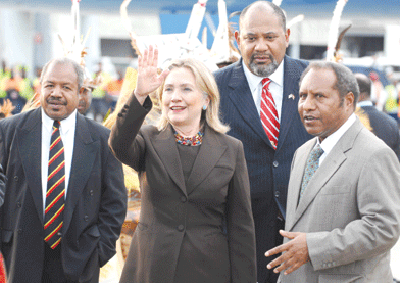
The United States decision to set up an aid base in Fiji is being welcomed by local commentators on Fijian issues.
Secretary of State Hillary Clinton, who is in Christchurch today as part of her eight-country tour of the Asia-Pacific region, announced last week the United States would re-establish aid to the Pacific after 16 years.
Coalition for Democracy in Fiji spokesperson Nik Naidu says it is a positive move by the US to base a Pacific aid operation in Fiji because dialogue can be created between the two countries.
He says previous tactics of imposing sanctions on Fiji – governed by a military-backed regime – have not worked and there needs to be a compromise between governments in order to restore democracy.
“The cold war period is over,” says Naidu. “Dialogue is the only option now.”
Radio Tarana managing director Robert Kahn also thinks the US setting up an aid campaign base in Fiji will be beneficial in enhancing the relationships between the people and the governments of both countries.
“Fiji is the hub of the Pacific Island region based on its superior infrastructure, resources and educated work force.
Climate change
“It’s a sign of commitment by the US government to assist Pacific Island nations and change of foreign policy which has been identified as a need. The US recognises the need of regaining the benefit it once had in the Pacific.”
The US Agency for International Development (USAID) hub will begin with a budget of $27.5 million specifically for climate change mitigation.
Professor Crosbie Walsh, a retired development studies academic, says a base in Fiji makes good geographic, logistic and political sense, because Fiji is “hub of the South Pacific” – but it is only a token.
“The USAID base and the amount of money involved are only tokens, but, given the present Fiji situation, they are important tokens nonetheless,” he says.
Walsh says the most likely reason the US has returned to Fiji is because of America’s concern over Fiji’s increasing alliance with China and a concern Australian and NZ policies have done little to “bring Fiji to heel” or advance the return to democracy.
“America may hope that its bigger presence in Fiji will better equip it to play a mediator role, given that Australia and NZ have so blotted their copy book that they can no longer do so,” he says.
“Someone has to break the impasse in a way that leads to positive outcomes on the way towards elections in 2014 with no one losing face.”
Walsh says sanctions imposed on Fiji with New Zealand’s backing since the 2006 military coup – such as the European Union stopping assistance to Fiji’s sugar industry and travel sanctions – have sought to cripple the Fiji government and its economy.
Hidden from view
He says the new US involvement may prompt the New Zealand government to change its actions on Fiji, but these changes are likely to be mostly hidden from view and only evident over time.
“Nothing is going to happen suddenly or dramatically. New Zealand has dug itself a deep hole with its well meaning but ill-advised policies on Fiji, and it will take quite a time to dig itself out,” he says.
Clinton will head to Australia this weekend to hold talks with Prime Minister Julia Gillard, Foreign Minister Kevin Rudd and Defence Minister Stephen Smith to discuss regional and global issues.
Courtney Wilson is a final year Bachelor of Communication Studies student journalist on internship with the Pacific Media Centre.
US chooses Fiji for aid base in Pacific despite dictatorship



